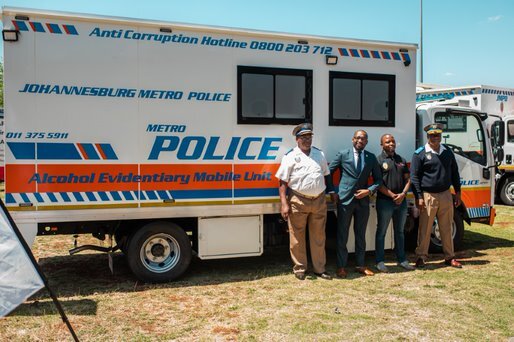For more than a decade, alcohol evidence centers (AECs) have helped make roads safer in South Africa by enabling law enforcement to test suspected drunk drivers and confirm their breath limit. Today there are 10 brick and mortar AECs and ten mobile units throughout the country, thanks to a joint effort between municipalities, law enforcement and our local brewer, South African Breweries.
The centers are outfitted with world-class infrastructure and technology. This includes evidentiary breath alcohol testing which delivers immediate test results and contributes to a higher rate of prosecution for drunk drivers. A staff of medical practitioners help ensure evidence is properly collected and is admissible in court. Mobile AEC units allow authorities to be stationed in ‘hot spots’ for drunk driving in Qonce, Buffalo City, Nelson Mandela Bay and Johannesburg.
“SAB believes more interventions need to take place to make South Africa’s roads safer,” says Zoleka Lisa, Vice President of Corporate Affairs at SAB. “Our mission is to partner with traffic law enforcement partners in trying to combat road fatalities. This has been made possible through interventions such as the mobile AECs.”
“The [mobile AEC] unit in Qonce will be utilized throughout the year. It will not only be used for law enforcement but also to create awareness of the risks of driving under the influence,” said Quinton Chetty, Commander of Traffic Services at the Buffalo City Metropolitan Municipality.
Supporting AECs is part of the SAB Sharp platform, which was developed to promote moderation and responsible drinking in the country. The effort also contributes to AB InBev’s Smart Drinking goals – a set of programs and initiatives focused on shifting social norms, consumer behaviors, and business practices to reduce harmful consumption.

With support from South African Breweries, mobile AEC units allow authorities to be stationed in ‘hot spots’ for drunk driving in Qonce, Buffalo City, Nelson Mandela Bay and Johannesburg.
“Working in partnership with public health bodies, civil society and governments, we aim to implement evidence-based approaches, uncover new ways to reduce the harmful use of alcohol and act upon them,” said Tinumzi Lubelwana, SAB’s Regional Corporate Affairs Manager. “The AECs are an incredible testament to this approach and proves that it is working.”
Addressing the root causes of harmful consumption
AB InBev is contributing to the UN goal of achieving a 50% reduction in road fatalities by 2030, and the Road Safety Decade of Action. “As we work toward this ambitious goal, we know that we cannot act alone,” said Catalina Garcia, Global Director of Corporate Affairs at AB InBev. “AB InBev and its affiliates worldwide will continue to build global and local partnerships both within communities and across borders to develop robust, evidence-based solutions that include enforcement programs like AECs, infrastructure development and changing behaviors that lead to harmful consumption.”
"Effective enforcement strategies like we see in South Africa can serve as powerful deterrents against unsafe behaviors," said Josh Girard, Global Director of Smart Drinking at AB InBev. "In addition, we take a proactive approach that centers on education, training, social norms marketing campaigns, Responsible Beverage Service, and community engagement. We firmly believe that well-designed programs aimed at addressing the underlying causes of harmful consumption can play a vital role in preventing drinking and driving incidents."

